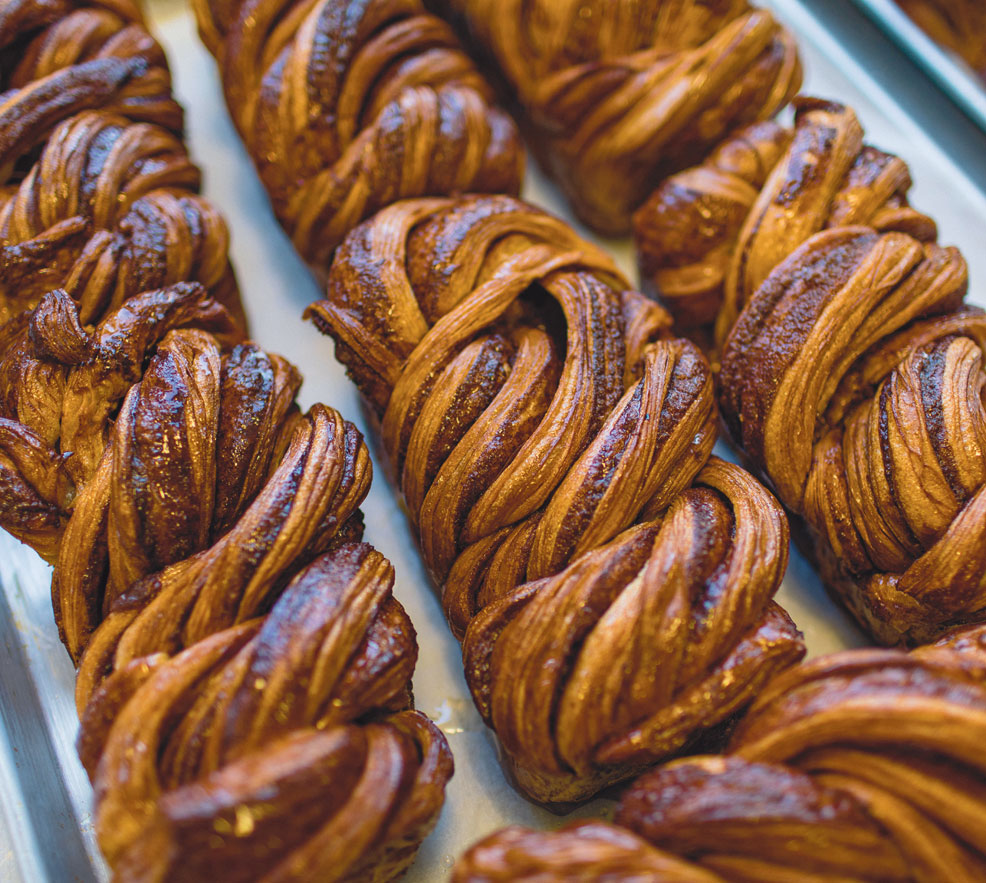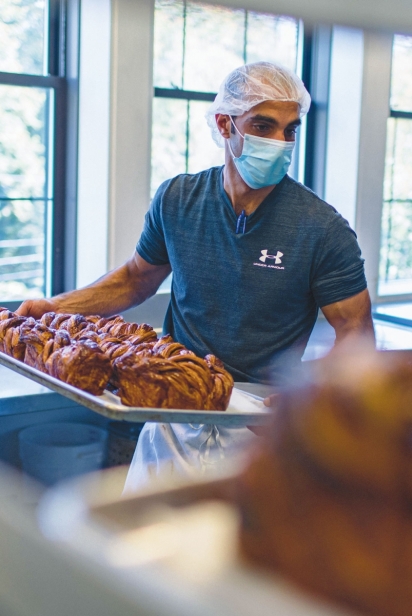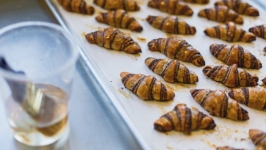Guy Hanuka Creates Buns Bakery Amidst the Pandemic
Quarantine Baking Becomes a Business for Israeli-born Entrepreneur
Imagine creating a new business in the midst of a pandemic. Guy Hanuka, owner of BUNS Bakery, said it all started when he made a quarantine post on Facebook last spring: “Would anyone be interested in challahs and babkas for the weekend?”
Hanuka, who was home baking during his non-work hours, experienced an amazing response: He made 40 babkas and 40 challahs that weekend. “It was just crazy,” he said. He and his wife, Erin Hough, “didn’t expect that response from a social media post.” Realizing that such demand would overwhelm their home kitchen, Hanuka quickly found the kitchens at food business incubator Hope & Main in Warren.
Like many culinary whiz kids, Hanuka, Israeli-born and bred, began his culinary journey as a dishwasher, though he enjoyed baking as a young boy with his mother. After several years working in and opening bakeries in Tel Aviv, Israel, and opening another bakery in Shanghai, China, Hanuka was ready for the next step.
“I wanted academic experience. I’m a perfectionist; that’s what makes me the baker I am.” Through culinary connections, he met the head baker at King Arthur Flour, who encouraged Hanuka to attend Johnson & Wales University. Earning his associate’s degree in baking and pastry arts from the university in 2018, Hanuka is working toward his bachelor’s degree and has several credits toward JWU’s entrepreneurship program.
Some of his product names hint at their deliciousness, such as rugelach (Rugelahhh!), challah (Holla!) and chocolate babka (Choc Båb); others are straightforward: Pear Tart; Honey Bee Cake.
“I’m an old-fashioned guy,” said Hanuka. “It was very important for me to have a solid base in baking knowledge before I started to interpret traditional recipes in my own way.” That’s how he segued from making summertime blueberry babkas to apple and cinnamon babkas for Rosh Hashanah, when apples are integral to holiday meals.
Like other Israeli bakers, Hanuka uses a Danish yeast dough for babkas and rugelach. For rugelach, he laminates the Danish dough with butter and rolls it out like a croissant. Then he folds the Belgian chocolate filling that he makes into the dough to create layer upon layer of deliciously addictive chocolate and flaky pastry.
Traditional rugelach’s origins date back to the Hungarian kifli, the Austrian kipferl and the Polish rogal. Back then, the crescent- shape filled pastry was made with yeast dough and filled with jams or nuts, according to Israeli news outlet Haaretz in its August 2014 article, “The Little Pastry That Could: How Rugelach Became Israeli’s Go- To Sweet.”
While rugelach is extremely popular throughout Israel and among American Jews, the article noted, “[R]ugelach, which traveled east and west from Central Europe, and ended as very different pastries, carrying the same name, in the U.S. and in Israel.” American bakers adopted a yeast-free, cream cheese dough filled with nuts and dried fruits or jams; in Israel, high-end bakers began making a yeast dough, laminated with layers of butter and filled with chocolate, poppy seed or cinnamon.
Focusing on perfecting every step of the baking process—from mixing and fermenting to laminating the dough—Hanuka said, “I don’t believe in recipes, but in understanding and completing the processes correctly.”
Asked what advice he’d offer folks eager to bake rugelach at home, Hanuka said, “Don’t cut corners, use the best ingredients, be patient and love what you create. It takes me two days to make rugelach.”
While his expertise in bringing the right flavors, textures and consistencies to his products is important—as are the tremendous hours involved in the process and his love for what he does—Hanuka also credits the relationships he and Hough have developed with people in the community. “There’s the challah or the babka [currently his best-selling products], but it’s really the relationships with the people who buy from us. People try the pastries and stay with us; we’ve become part of their lives.”
Word-of-mouth, rather than official marketing, has helped drive business, said Hanuka, who credits Providence resident Paula Bodo with building his community. Warmhearted and generous, Bodo, who spent 10 years of her childhood in Israel, considers Hanuka “her fourth son.” With long-term hopes of opening a brick-and-mortar bakery one day, Hanuka said, “We’re modernizing Jewish baking, which used to be considered Old World, for our 21st-century customers.”
With no official role in the business, Hough regularly helps Hanuka with deliveries, answering emails and brainstorming ideas. While chocolate babka is a favorite for them both, Hanuka also loves challah for sandwiches. Was BUNS Bakery named for its delicious baked goods? Not a chance: “Buns,” said Hanuka, “is our term of endearment for each other!”
Reflecting on his success to date, Hanuka added, “It’s an immigrant’s story; it’s a world traveler’s story; it’s a baker’s story; it’s a story about starting a business in a pandemic.”
For more information on ordering BUNS Bakery items for pickup at various locations in Rhode Island, visit BunsBakeryRI.squarespace.com.







